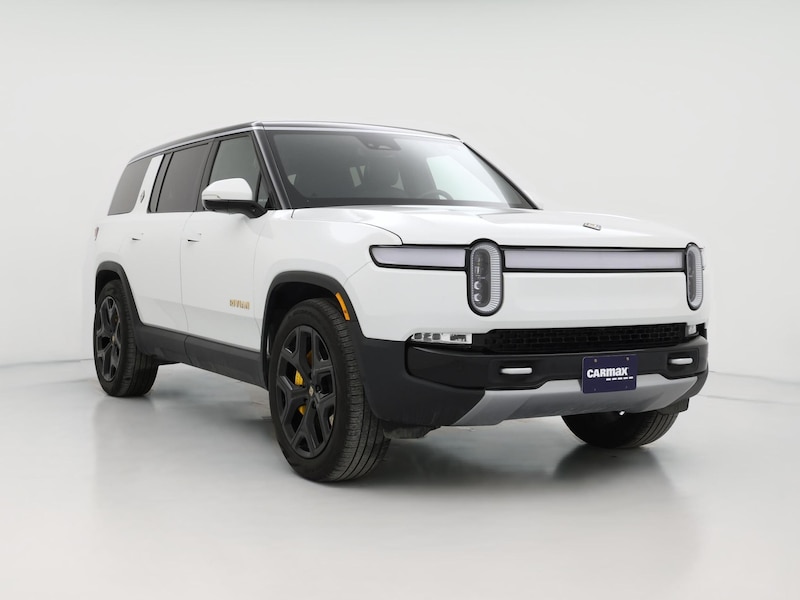
EV charging cost calculator
Find out the estimated cost to charge electric cars in your area
Estimate the cost to charge your EV
The cost to charge is an important consideration when buying an electric vehicle. Determine the projected cost in your area by using the inputs here.
EPA-estimated range when new: 222 miles
Manufacturer-specified battery capacity when new: 95 kWh
Estimated utility rate†: $0.16 per kWh (value based on a national average)
Monthly estimated charging cost at home
for a Audi E-Tron driven 1000 miles in the US
$68
Estimated cost to fully charge (0-100%)
at home (level 1 or 2)
$15.20
at a DC fast charger††
$34 - $59
Understanding battery charging
Making the switch to an electric car, truck, or SUV can seem intimidating with the avalanche of new lingo. But once you learn how it all works, an EV might actually simplify your life. Edmunds experts runs through what you need to know about electric car chargers and charging your car.
FAQs about electric vehicle charging
With the proper cable (typically included with the car), you can plug into a common 120V power outlet and gain 3-5 miles of range per hour charged. If you drive 20-30 miles per day, you can plug your BEV in each night and regain the range used during the day.
If you want a faster charge you can explore upgrading to a 240V system, which typically provides 10-20 miles of range per hour charged. For any modifications to your home’s power system, consult an electrician to add 240V outlets, installed charging boxes, and ensure your home can support the proper amperage.
The three most common charging plugs that have been offered on BEVs and PHEVs are as follows:
CCS / J1772 – The CSS / J1772 plug has been the most common in North America and had been the market standard until 2023. It has two variations, the standard J1772 plug with 5 pins that supports Level 1 and 2 charging, or the enhanced CCS (Combined Charging System) plug that adds 2 pins (for 7 total) and supports DC fast charging.
NACS – While used only by Tesla until 2023, most automakers have announced they’ll switch future models sold in the US to use NACS (North American Charging Standard). The NACS plug is smaller than the CCS and, for some, easier to handle.
CHAdeMO – The “Chad Mo” plug is a Japanese-market standard and was used on early BEVs/PHEVs like the Nissan Leaf and Mitsubishi Outlander PHEV, though both automakers have said they'll move to other standards in North America.
The CCS, NACS, and CHAdeMO all support DC fast charging; however, when using a public fast charger you’ll need to find one that has the appropriate plug for your vehicle.
EV battery life depends on many things, including the make, model, use, condition, and maintenance of the vehicle. The battery will experience some degradation over time (just as internal combustion engines experience some degradation as they age); however, a majority of electrified vehicles on US roadways are younger than 8 years so we don’t yet fully know.
The US government mandates manufacturers provide warranties for the batteries in BEVs, PHEVs, and HEVs for 8 years or 100,000 miles, whichever happens first. You can read more on the EPA’s website.
There are several types of charging available for your electric vehicle:
- Level 1 charging at home (standard home wall outlet): a common 120V power outlet provides about 3-5 miles of range per hour charged. A good practice of many BEV and PHEV owners is to charge overnight, where you can achieve a 30-mile range in 6-8 hours, so you don’t start your day with an empty battery.
- Level 2 charging at home (upgraded home wall outlet + charging box): a conventional 240V power outlet—like one your washing machine uses—provides power at a faster 10-20 miles of range per hour charged. You will need a charging regulator box to protect the vehicle against things like power surges, which can cost $500-$1000+ before installation. For any modifications to your home’s power system, consult an electrician to add 240V outlets and ensure your home can support the proper amperage.
- Level 2 charging in public (public charging networks): public chargers can also be used on BEVs and PHEVs, though for a PHEV you should evaluate if the cost is justified—because the price of charging at public chargers varies, and it may be cheaper to simply use the gasoline already in your car.
- Direct current (DC) fast charging: DC fast charging uses direct current (DC) electricity to charge the battery of an electric vehicle. DC fast charging is much faster than Level 1 and Level 2 charging, charging an EV battery up to 80% in about 30 minutes. It’s an ideal option for longer trips and for charging an EV quickly when time is limited. PHEVs do not support direct current fast charging (also known as Level 3 charging); that would be like trying to fill a small bucket with a fire hose.
Research alternative fuel options
Ready to find your EV?
We hope you found this information helpful. This content is intended to inform and is not meant to indicate that a particular vehicle is currently available or recommended for you.
Statements of fuel economy or EV range are based on EPA and other third-party estimates for vehicles when new. Fuel economy and EV range will degrade with time and vary based on age, driving conditions, vehicle history, and other conditions. See fueleconomy.gov for more info.
Editorial content contained on this page comes from Edmunds.com, Inc., a subsidiary of CarMax Enterprise Service, LLC, and information related to featured vehicles comes from third-party sources, including manufacturer information. Product and company names may be trademarks or registered trademarks of third-party entities. Use of them does not imply any affiliation with or endorsement by these entities. By clicking on any video links, you will be taken to a third-party site maintained by YouTube, Inc.
We make every effort to provide accurate information, but please verify before purchasing.

















